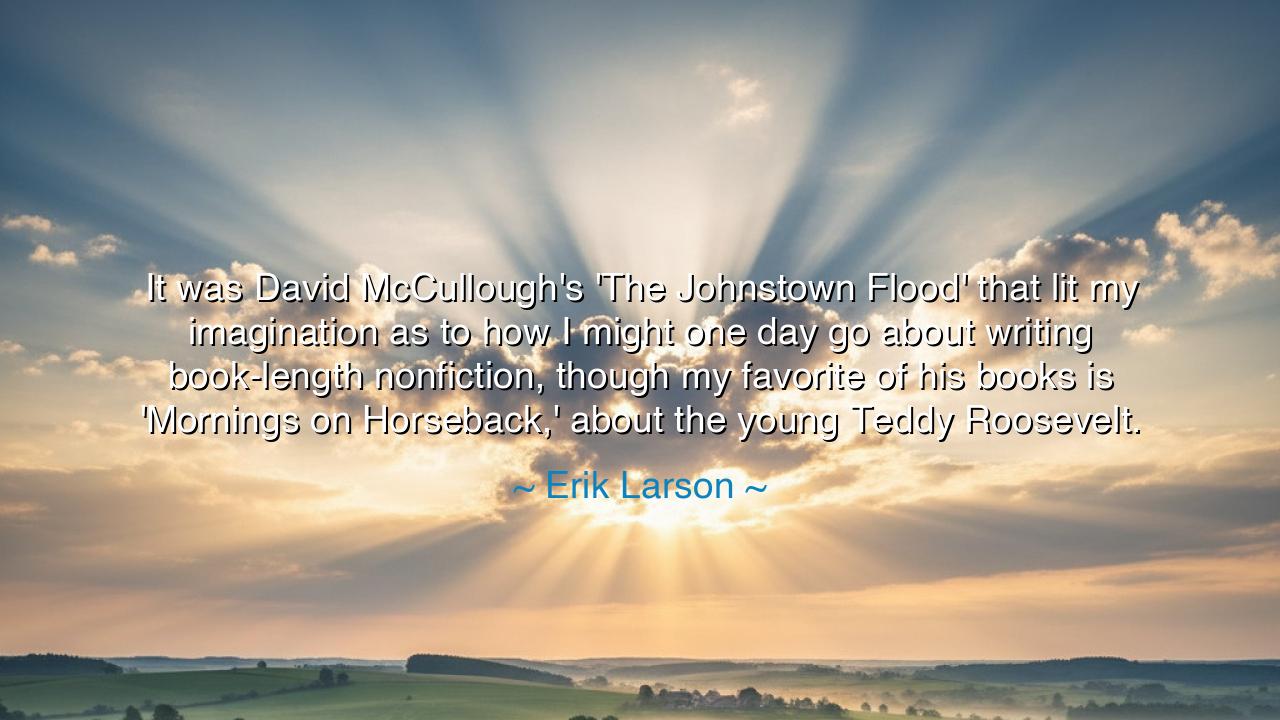
It was David McCullough's 'The Johnstown Flood' that lit my
It was David McCullough's 'The Johnstown Flood' that lit my imagination as to how I might one day go about writing book-length nonfiction, though my favorite of his books is 'Mornings on Horseback,' about the young Teddy Roosevelt.






The words of Erik Larson — “It was David McCullough’s ‘The Johnstown Flood’ that lit my imagination as to how I might one day go about writing book-length nonfiction, though my favorite of his books is ‘Mornings on Horseback,’ about the young Teddy Roosevelt.” — speak of inspiration, of the sacred moment when one spirit ignites another. In these words, there burns the quiet fire of imagination, that divine spark which transforms admiration into creation. Larson, who would one day craft his own masterpieces of narrative nonfiction, pays homage to David McCullough, the great chronicler of history’s human heart. This is not merely a statement of literary influence — it is a testament to how one voice can awaken another, how the power of example can shape destiny.
In every age, there are torches passed between kindred souls — from master to student, from artist to dreamer, from history to the present. McCullough’s The Johnstown Flood did not merely recount a tragedy of water and ruin; it revealed the art of making history live. Through his words, Larson’s imagination was lit, and he glimpsed the path his own craft might take: to write truth as if it were poetry, to breathe life into the bones of fact. The book became not only a story of disaster but a revelation of possibility — showing how nonfiction, when shaped by vision and heart, can move readers as deeply as myth or legend.
This act of awakening mirrors a pattern that stretches across centuries. For every creator who rises, there is one who first illuminates the way. Michelangelo, before touching stone, studied the works of Ghiberti and Donatello. Shakespeare learned from Plutarch and the tales of Holinshed. The philosopher Aristotle built upon the wisdom of Plato, who in turn drank from the well of Socrates. So it was with McCullough and Larson — the lineage of inspiration unbroken, the torch carried from one generation of truth-tellers to the next. The ancients knew that such transmission is not imitation, but continuation — the eternal flow of creative energy that binds all who seek to understand the world.
McCullough’s Mornings on Horseback, Larson tells us, was his favorite. It is the story of Theodore Roosevelt, the young man of frailty and fire who transformed weakness into strength. In that tale of growth and self-overcoming, Larson found not only a portrait of a president, but a reflection of the writer’s own journey — the struggle to master one’s voice, to wrestle chaos into clarity, to turn imagination into disciplined creation. For like Roosevelt, the artist must fight the battle within before he can shape the world without. McCullough’s art did not only teach how to write; it taught how to see — how to look upon the past with empathy, curiosity, and moral courage.
From such encounters are lives forever changed. When imagination is kindled, it becomes a living force — restless, luminous, demanding expression. Larson’s later works, from The Devil in the White City to Dead Wake, echo the same reverence for history that McCullough embodied: the belief that truth, when told with beauty, can stir the soul as deeply as fiction. Thus, the lineage continues. The disciple becomes the master, the inspired becomes the inspirer, and the fire moves on. So it has always been, from the bards of Homer’s time to the chroniclers of our own.
But this quote also speaks to something greater than writing — it speaks to the nature of human legacy. Every life, when lived with integrity and passion, becomes a page in someone else’s book. Every work we create, every kindness we show, every truth we tell may kindle a flame in another heart. We do not always see whose path we have lit — yet the world moves forward because of such unseen torches. The imagination, once awakened in one soul, becomes a force that ripples across generations, reshaping minds, arts, and histories yet unborn.
Let this be the teaching, then: seek the works, the voices, the teachers that ignite your imagination. Read not only to know, but to awaken. Honor those who have guided you by carrying their light into your own craft, whatever form it takes. And when your own light burns bright, do not hoard it — let it shine into the darkness, where others may find it and begin their own journey.
For as the ancients would say, one flame does not diminish another — it multiplies the light. The imagination, when shared, does not fade but grows stronger, burning from mind to mind, century to century. Such is the legacy of McCullough and Larson, and of all who dare to tell the stories that keep humanity awake. Therefore, kindle your own imagination daily, and live in such a way that when another seeks the fire, they will find it burning in you.






AAdministratorAdministrator
Welcome, honored guests. Please leave a comment, we will respond soon